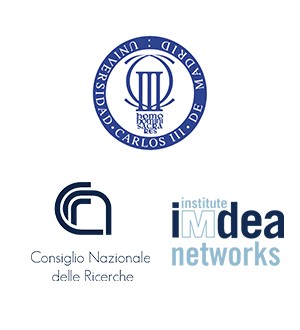The Data Transparency Lab (DTL) announced today the projects that will benefit from a 50,000 euro grant to develop applications that allow users to be aware of how companies use their personal data throughout the Internet. Researchers at IMDEA Networks are among the recipients of these grants. Telefónica, together with other organizations such as AT&T, Mozilla, INRIA and MIT Connection Science, sponsors this initiative by the DTL grants program.
The project IMDEA Networks is a part of together with University Carlos III of Madrid (UC3M) (Spain) and the Consiglio Nazionale delle Ricerche (Italy) is "Facing the hard truth: showing users what mobile apps can learn about them from the location data they collect”. The researchers at IMDEA Networks working on this project are Albert Banchs (Deputy Director of the Institute and Professor at UC3M) and Dario Bega (PhD Student). Marco Gramaglia, now at UC3M, is an alumnus of IMDEA Netowrks. CNR is represented by Marco Flore.
We reproduce here in full an article published at the Spanish news media «Noticias Internet y Móviles». The article expands on the characteristics and implications of these grants and on the different projects and organizations awarded.
Link to the news in original Spanish

«Facing the hard truth: showing users what mobile apps can learn about them from the location data they collect»
Albert Banchs (University Carlos III of Madrid / IMDEA Networks); Marco Fiore (Consiglio Nazionale delle Ricerche), Marco Gramaglia (University Carlos III of Madrid), Dario Bega (University Carlos III of Madrid / IMDEA Networks)
 While most mobile applications nowadays fulfil basic privacy-preserving properties, they still leave significant surfaces open for privacy breaches that leverage on subtle features of the collected data. The focus of this proposal is to analyse this problem for trajectory data. Such data is the foundation of Location-Based Services (LBS), which represent a significant portion of today’s most popular mobile services, but may also be collected by applications that offer opt-in geo-referencing or even by the mobile operator itself. While the the user is usually informed at install time that the service will access positioning data, she is given absolutely no information about the frequency with which data is collected and how it is used precisely upon collection — including purposes that go beyond the primary objective of the application. The objective of this project is raising user awareness about the privacy leakage of trajectory data. To this end, we will provide end-users with (i) a clear, intuitive visualizations of the precise spatiotemporal trajectory information gathered by each mobile application, (ii) an equivalent visualization from localization data possibly gathered by the operator from their mobile network activity, and (iii) indirect knowledge that may infer from the trajectory data it gathered by using data mining techniques, including, e.g., home address, employer’s name, commuting patterns, religion, health issues, etc.
While most mobile applications nowadays fulfil basic privacy-preserving properties, they still leave significant surfaces open for privacy breaches that leverage on subtle features of the collected data. The focus of this proposal is to analyse this problem for trajectory data. Such data is the foundation of Location-Based Services (LBS), which represent a significant portion of today’s most popular mobile services, but may also be collected by applications that offer opt-in geo-referencing or even by the mobile operator itself. While the the user is usually informed at install time that the service will access positioning data, she is given absolutely no information about the frequency with which data is collected and how it is used precisely upon collection — including purposes that go beyond the primary objective of the application. The objective of this project is raising user awareness about the privacy leakage of trajectory data. To this end, we will provide end-users with (i) a clear, intuitive visualizations of the precise spatiotemporal trajectory information gathered by each mobile application, (ii) an equivalent visualization from localization data possibly gathered by the operator from their mobile network activity, and (iii) indirect knowledge that may infer from the trajectory data it gathered by using data mining techniques, including, e.g., home address, employer’s name, commuting patterns, religion, health issues, etc.
- DTL Grantees 2017
- Noticias Internet y Móviles: Telefónica y DTL conceden becas a investigación de privacidad de datos


